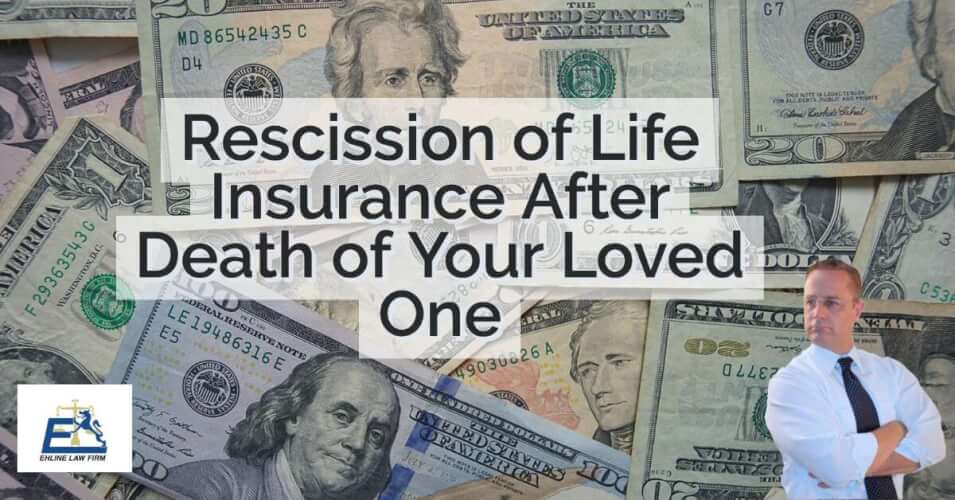
Rescission of Life Insurance After Death of Your Loved One

Rescission of Life Insurance After Death of Your Loved One

When you or a loved one submit premium payments, you never expect a denial of a postmortem life insurance claim when the policyholder dies. Words like “material misrepresentation,” “bad faith,” and “policy cancellation” may be new to you or your family members but not to life insurers.
If you landed on this page, you’re at your wit’s end, a researcher attempting to understand the life insurance claim denials process. Even if you came here for general information purposes, there are no limitations on what you’ll learn below.
The article will explain how life insurance policies work and what to do when the insurance company denies or voids your life insurance application.
In the end, I will give you some bonus information about pursuing a death benefits claim with or without life insurance lawyers helping you when an insurance claim is denied after the policyholder dies.
This article intends to ensure the insurer pays you instead of sending you a denial letter.
Why Hire Life Insurance Lawyers?
Death, associated funeral, probate, and life insurance claims come with compounding administrative paperwork. When someone whose life is insured with a life insurance policy dies, life insurance companies often deny the insurance claims brought by the heirs.
Denying the heir’s claim will bar life insurance coverage under the life insurance contract description of benefits.
Ehline Law is an award-winning law firm in California headquartered in Los Angeles with experienced attorneys. Our best attorney helps people with personal injury cases, life insurance denial, and much more.
- Satisfied clients won’t deny our superior first-class attorneys have more than a decade of experience winning.
- We seek to maximize damages and intended compensation awards against bad-faith life insurance company tactics, aiming to expose political influence and force judicial review.
Ehline Law Firm’s lawyers serve people injured in passenger car accidents, motorcycles, dog bites, bicycles, cruise ships, wrongful death, and physical injuries.
What should I know about life insurance?
A life insurance policy is a contract between a policyholder, and an insurance firm that insures people against death. In most cases, a person’s death is compensated by extending an insurance policy to the end of its term, ranging from one to thirty years. Whole life insurance guarantees you lifelong protection and aid in retirement.
A life insurance policy is valuable because it provides your family with a crucial financial safety net. At the time of your death, the insurer will pay a death benefit to your beneficiaries. However, the plan includes a cash-value component that grows over time, much like a savings account. It’s less expensive than whole life insurance.

What Does The Life Insurance Company Do When the Policy Owner Dies?
When the life insurance policyholder dies, the survivors must inform the insurance company to receive death benefits as a life insurance payout. Under most life insurance policies, the life insurance company may indemnify the death benefit as a lump sum payout.
If I die and have unpaid debts, can creditors seize my money?
Generally, NO. But when surviving policy beneficiary exists, creditors could sue for your money during the death-benefit funding period. If the beneficiary is named correctly, your benefit goes right to that beneficiary, and the creditor has no right to return it.
Filing Life Insurance Claims and Prompt Payments
You do not necessarily have to file a claim for a life insurance policy within a specific time frame (depending on the life insurance company and some state laws).
The life insurance death benefit will usually grow with interest until the claim is filed or the life insurance company can find the beneficiary.
Insurers remain obligated to pay any valid life insurance claim death benefit. State laws also mandate prompt payment of life insurance money.
But to know what “valid” is, you must read and understand the contract and laws of your state. You practically must be a lawyer to interpret a life insurance claim. Each state has a different set of laws that regulate life insurance companies differently to make things harder.
Each state has its rules with a set time frame that a life insurance company can take to pay a claim. Most life insurance companies will pay you death benefits faster if you take certain steps to fill for a payout.
How to Make A Life Insurance Company Pay Claims Faster?
The beneficiary can take specific steps to expedite a death claim faster. Before we get into that, you must remember that the insurer has to confirm some facts under California law.
Your state laws are probably similar in certain situations. You must be patient during this process. Unless the claim is denied immediately, you must understand that most claims won’t be paid directly.
In other words, these claims take a certain amount of time after the insured’s death for a total death benefit payout.
Legal Issue – Why do life insurance companies deny claims?
Insurance companies often decline life insurance claims based on misinformation when the insured fails to include something in the insurance policy. (hobbies like scuba diving and motorcycle riding).
A life insurance claim denial is challenging as the rescission asserts the decedent made misrepresentations.
How do I respond to a life insurance claim denied?
If your life insurance application was denied or pushed back excessively, you might be entitled to reimbursement. To obtain information on the company’s refusal, contact them. This is required by law in California and most states.
The next stage is to contact a professional insurance claims attorney, where you may discuss your rights and choices for recovering and defending your claim. You may receive denial letters from the decedent’s insurer. You’ll receive a vague reason or no reason for the denied claim.
Special Contestability Problem – Dead People Can’t Speak
Dead people can not defend a coverage denial, nor can you without the right records and contacting an insurance attorney. Most state lawmakers know this and have carved out statutes detailing when an insurer can cancel a policy legally.
Two-Year Contestability Period?
According to courts and California law, an insurance company can only rescind a life insurance policy during the policy’s contestability period. Failure to verify information will generally bar the insurance from denying claims for life insurance benefits. (Usually two years after issuance or reinstatement under California Insurance Code §10113.5.)
Assuming the policy is in the two-year contestability period when a person whose life was insured dies, an insurance company can seek to rescind the policy in California based on misstatements in the application. Legal advice and guidance are handy when insurers hit you with a policy cancellation. Your financial situation may hinge on the validity of a policy cancellation.
Notice and Opportunity Laws
According to California’s Civil Code §1691, the insurance company must give prompt notice and refund premiums to effect a rescission. Failure to return or provide the appropriate notice constitutes grounds for illegitimate denial.
An insurance company denies a life insurance claim to prove that the applicant-policyholder made a material misrepresentation defiling accuracy during the application process. Life insurance companies looking to deny claims may argue they would not have accepted the risk had they known its intricacies beforehand.
Fraud and Misrepresentation?
If the decedent were ambiguous or withheld information that would impact the investigation, constituting fraud or misrepresentation, this would form a valid basis to refuse benefit payments. A misrepresentation in an insurance application can be a false statement concerning the insured’s past or present facts before purchasing the insurance guarantee.
How do I cancel my deceased person’s insurance?
In certain states, companies can withdraw policies within two years from purchase.
How Do I Claim Death Benefits In My Individual Case?
Insurers must pay out the intended policy benefits within 30-days of receipt of the requested supporting documents:
- Death certificate
- Declaration of heirship or will
- ID from the beneficiary or beneficiaries
- The insured’s birth certificate.
Providing these documents to the insurer early in the process helps ensure your life insurance claim is settled smoothly.
Do I Get A Refund For Overpayments Overlapping A Death?
The insurance policy ends at the time of death. Any premium over-payments will also be refunded to the life insurance beneficiary.
How Long are Life Insurance Policies Good for After Death?
How long can life insurance stay before paying out? Losing someone you love is hard enough, and not receiving the individual’s life insurance policy death benefit on time can make it even harder.
Even when there is no time limit clearly stated for an insurance company to pay claims after a policyholder dies, most insurers have internal policies and a timeframe developed to ensure fair insurance claims practices.
Specific Timeframes
Many are paid within the first 30 days. It is scarce for an insurer not to pay claims in 60 days or more. If documents are in place, it should take 10 to 14 days to deliver the insurance claim.
Stating the exact number of days it would take is difficult simply due to the amount of time it will take depending on the company, the laws of your state, and the speed at which you provide your insurer with all of the claims requirements.
The insured failed to name a community spouse beneficiary
In a community-owned automobile insurance policy, a partner may get a 50% refund of their death benefit. One life insurance lawyer can help you understand your legal rights. If you want to learn more about a spouse’s life insurance rights after a policyholder dies, we have an overview of our insurance website blog here.
The beneficiary was changed after a divorce
Several statutes can cancel life insurance benefits. Life insurance claim personnel may not be aware of the intricacies of these regulations, which are complicated and entangled between state court, federal court, and state legislation.
As a single parent, you’ll want to consider how “Gone Daddy” might affect how you protect your child’s life for decades to come, no matter their age. Suppose another father remains in the picture, as happens in many divorce cases. In that case, children raised by single mothers will be pinned between a woman who depends on another man for money and survival. Life insurance helps remove this involuntary servitude from the equation.
Wrong Acting Insurer?
Life insurance claims are frequently delayed because of the insurance provider’s strategies. A business that delays your claim excessively long without justifying it might be acting wrongly.
The beneficiary of the policy is a minor
If the insured names their younger dependent dependents as beneficiaries, they can submit a life loss claim. Without a guardian, a youngster cannot receive money. A life insurance professional can assist you with your pending paperwork until it is correctly processed.
The beneficiary was not updated after a major life change
Some people report receiving the same benefit after their death. If this happens, an insurance company’s claim might be delayed, resulting in a delay in making interpleader claims. Insurance companies are also ready to submit claims following deaths in this area. People can name new beneficiaries for their life insurance policies.
The employer failed to submit a waiver of premiums
Many of these group insurance plans cover both employees and their dependents. Of course, human resource departments are in charge of negotiating between life insurers and insured workers.
Misrepresented life insurance claims are the underlying reason for death in some US workers.
A denied group life insurance policy claim does not consider any additional claims. Beneficiaries are protected from unjustly rejected claims. Benefits can be restored through the legal system if they are unjustifiably denied. To get complete information and suggestions on unclaimed compensation, read more here.
Death wasn’t covered under the policy
In almost all life insurance agreements, the parties are protected against various exclusions, which list issues that may or may not apply. Many exceptions are vague, and many, when combined, exclude one another.
On the other hand, many insurance firms employ these exclusions to discourage claims by a policyholder. Here are some of the most prevalent exclusions that life insurers utilize as proof of rejecting a death benefit: Exclusions can be worded precisely by insurance providers to cover a wide range of possible circumstances.
There is no beneficiary designation on file
Every insurance policy has provisions for determining who will have access to cash if there is no designated beneficiary. According to the country’s rules, insurance firms pay the proceeds if a beneficiary is never designated, where the policy was taken out of the contract.
Claimants may experience lengthy delays and deny their payments if the insurance provider fails to compensate the appropriate persons. According to our article on life insurance without a beneficiary, more instances have occurred where this has happened.
We also wrote about the difficulties with life insurance policies that don’t have additional benefits.
The premiums were not paid, leading to a lapse in payment
Denied claims by lapse are frequent, and insurance companies frequently use premium payments rather than reinsurance to cover them. Your lawyer must verify the mail delivery address is genuine and correct and that the notice informed the insured of their lapse.
What About Delayed Life Insurance Claims?
And, of course, how long it will take them to process your documents. But most times, the insurance claim may be denied because the insurance agent or company wants to rescind the insurance with the claim of information exclusions or misrepresentation. Additionally, the insurer has a right to investigate any murder, suicide, accident, or other health concern to rule out any insurance fraud.
At this point, you need an experienced life insurance attorney. That is what we do at Ehline Law Firm. We build and maintain an attorney-client relationship that works. We ensure beneficiaries get the insurance benefits needed to help settle their loved one’s succession.
Problems With A Life Insurance Company?
Did you suffer an injury or death caused by a defendant’s negligence? Our legal services can remedy your situation when you pay premiums and insurers deny you. If not, we’ll go to war for you until the final resolution of your matter. Were you or a spouse unfairly denied life insurance benefits? Get a risk-free and cost-free consultation from a life insurance attorney in Los Angeles, California, today.
Questions? Call us at (213) 596-9642, or use our convenient online contact form 24/7 to learn more details. Our experts will handle your call in the order received, acting quickly on your behalf.
Categories

Michael Ehline
Michael Ehline is an inactive U.S. Marine and world-famous legal historian. Michael helped draft the Cruise Ship Safety Act and has won some of U.S. history’s largest motorcycle accident settlements. Together with his legal team, Michael and the Ehline Law Firm collect damages on behalf of clients. We pride ourselves on being available to answer your most pressing and difficult questions 24/7. We are proud sponsors of the Paul Ehline Memorial Motorcycle Ride and a Service Disabled Veteran Operated Business. (SDVOB.) We are ready to fight.
Go here for More Verdicts and Settlements.
